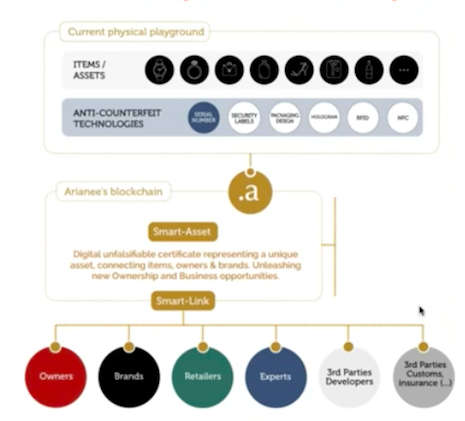 Eye on transparency
Eye on transparency
The luxury business, plagued by grey market goods and counterfeiting, could take these issues head on in the future through the use of blockchain technology.
During the webinar “Why luxury needs blockchain,” on June 7, executives in the industry discussed how the tech can solve problems that exist within the luxury sector. One panelist said that blockchain technology will eventually be as integrated, if not more so than, the Internet without users needing to understand its workings.
"It should be noted that it is not necessary to understand the inner workings of a technology to use it and benefit from it," said Frédéric Montagnon, founder of Arianee. "Really soon everybody will be using blockchain technology in their daily lives without even noticing it the same way you use the Web without a deep understanding of how TCP-IP or HTTP works."
The webinar was produced by Luxury Daily.
Blockchain of the future
Mr. Montagnon explained that in the near future everyone will be using blockchain tech without having a deep understanding of how it all works, similar to the Internet.
Arianee board member and former senior vice president of business development at Tiffany & Co. Jean-Marc Bellaiche believes that luxury’s answer to counterfeiting and authenticity issues is blockchain. According to him, it will also be the solution to many other gripes.
Chart in regards to blockchain technology. Image credit: Arianee
Each product can have a certificate of authenticity through blockchain that cannot be replicated and exists as a digital element. Mr. Bellaiche describes it as a passport for products.
It will also serve as proof of ownership, with the item having only one owner registered to it at a time.
Objects will be completely traceable through blockchain as well, with a detailed journey attached to each item.
While shopping in a store, products will be fitted with reference numbers or QR codes that customers can search or scan for the certificate of authenticity. Once purchased, the digital asset will automatically transfer from the business account to the customer’s personal account.
In such a time where consumers are aware and wary of their privacy and data being encroached on but have no means of stopping it, blockchain helps them gain more control.
Blockchain helps retailers and users. Image credit: Arianee
However, the technology still assists marketers, as it allows them to have access to a shared data infrastructure without the risk of being locked out.
Luc Jodet, cofounder of Arianee, also noted that it reinforces the security of data.
Luxury and blockchain
While it is still early on, there are variety of luxury brands embracing blockchain technology.
Real estate company New Commonwealth gave consumers the opportunity to buy a piece of two iconic properties in London, including the home of luxury brand Céline.
Under a new blockchain initiative, New Commonwealth is offering buyers the chance to purchase a share of one of two highly venerated properties in London, making them more accessible to the average investor. Along with the Céline building, the real estate firm is offering shares in the world famous Lord’s Cricket ground (see story).
"Blockchain enables an anonymous link between an owner and the brand," Mr. Bellaiche said. "This is especially useful for brands that tend to lose contact with final customers.
"Retailers do not always share the information they collect on customers," he said.
"Even if the brand sells directly to customers, the buyer might not be the actual final user. He or she might gift it to a loved one or resell it either after several years of ownership or right away."

